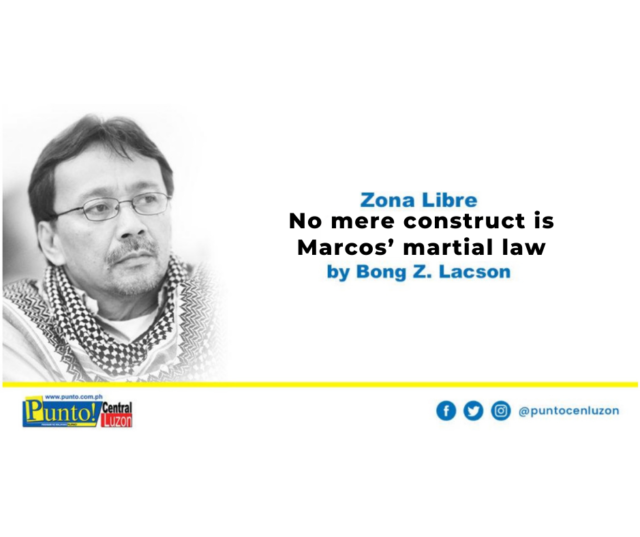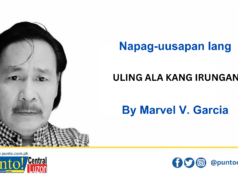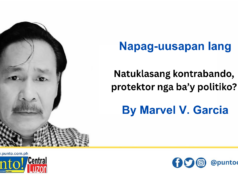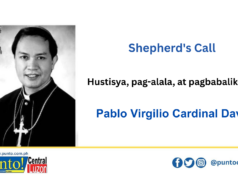“THE PRESENT generation that is loud in its condemnation of Marcos never experienced Marcos. So that rant is directed at their construct of Marcos. Shouldn’t they be studying Derrida and Lyotard more?”
San Beda Law Graduate School Dean Ranhilio Aquino falls flat on his snooty nose at this vain attempt at intellectual snobbery timed for the dead dictator’s birthdate.
No scale of Derrida’s Deconstruction, no scope of Lyotard’s “postmodern incredulity towards metanarratives” can disprove – as they can only hopelessly dispute – that Marcos, and all that evil that outlived him, happened. What with thousands upon thousands of Filipinos as living testimonials.
Generations of disconnect to the actual events are easily bridged by generations of those who were there. So, what stirred Aquino’s pa–intellectual idiocy?
Or did he just show what really lies beneath the veneer of his burnished law graduate school dean construct?
No mere construct though is my own story of martial law. Here reiterated for the nth time is its beginning:
A SATURDAY. Up early for a “DG” – discussion group – at the Assumption College in San Fernando.
Something uncanny, there is nothing but pure static on the radio. The usual though – light banter, small-town gossip among passengers – at the jeepney from somnolent Poblacion, Sto. Tomas to the capital.
Something uncanny, there are no newspapers at the news stands. Only komiks are being hawked by ambulant newsboys.
At the Assumption bus, some sense of gloom, a foreboding of doom, guarded whispers among us students of something terrifying…
On campus, a disturbing quietude. Still, some two–dozen hardcore KM-SDK activists go on with the DG originally to finalize the agenda of the demo at the gates of Camp Olivas planned for Tuesday.
Marcos has declared Martial Law. First heard from a kasama with a brother in the military. The PC – Philippine Constabulary – has been rounding known activists since last night. Not even pipsqueak of Makibaka, Huwag Matakot! heard.
Just then, a platoon of uniformed constables enters the campus. Enough for all of us to find any and all means out of Assumption except the main gate where, we presumed more PCs are posted, maybe even with machine guns.
Downtown San Fernando, in front of the town hall are 6X6 PC trucks, military fatigues are everywhere. Longhair is sheared not by scissors but mostly by bayonets and hunting knives.
Jumped on a passing jeepney, just in time. My long tresses – down to my shoulders and back – saved for the day.
Proclamation 1081 – declaring Martial Law in the Philippines though dated September 21, 1972 came into the open in September 23.
Martial Law! The news is out – even in barriotic Sto. Tomas. Arriving home, in time to see my mom stoking the last flames flickering on a mound of ash that used to be my beloved Communist Manifesto, Das Kapital, Lenin’s thoughts in volumes of pamphlets, Mao’s The Five Golden Rays and the Little Red Book, Amado Guerrero’s Lipunan at Rebolusyong Pilipino, posters of Che Guevarra, Marx, Lenin, and Mao.
In between tears, a jumble of Marx-Lenin-Mao thoughts – The history of all hitherto existing society is a history of class struggle… Capital is dead labor, that vampire-like, only lives by sucking living labor, and lives the more, the more labor it sucks…The way to crush the bourgeoisie is to grind them between the millstones of taxation and inflation…Trust the masses, rely on the masses, learn from the masses…The people, and the people alone, are the motive forces of history…
And Che’s mind too: What do the danger and sacrifices of a man or a nation matter, when the destiny of humanity is at stake?
All gone in a holocaust!
An early morning date with the neighbourhood barber the next day. After a long while, the sun burns my ears and nape again.
Lie low, really low. Take refuge in the rice paddies. In morbid fear of what tomorrow may bring.
So, what hath Martial Law immediately wrought?
Resumption of classes. By the main gate of Assumption College, the dreaded Black List is posted – names of activists who will not be re-admitted unless with clearance from the PC commander.
A piece of advice from my political science professor: “Don’t go to the PC alone, they will just arrest and detain you, as they did to a number of your comrades. Bring somebody influential with you.”
Apu Ceto
So, whom am I to seek but my spiritual director and rector at the Mother of Good Counsel Seminary – the Rev. Fr. Paciano B. Aniceto. (I was not even a year out “on probation” from San Jose Seminary then.)
At the Pampanga PC Command beside the Capitol, Apu Ceto vouched for me as a character witness before a panel of interrogators, and then took my case to the provincial commander himself – the dreaded Col. Isidoro de Guzman who would later earn infamy in the Escalante Massacre in Negros.
Alone at the interrogation room, I was subjected to romanza militar at my every answer the berdugos did not take to their liking.
“KM o SDK?”
Wala po – A smack on the head.
“Name? Alias?”
Caesar Lacson y Zapata. Nickname: Bong. No alias – A slap on the face.
“Ikaw si Carlos. Di ba ikaw itong nasa mga letrato (shoving to my face a number of photographs of marches, rallies and demos)”
Kamukha ko po – the table suddenly kisses my face.
Then off to the detention center at the side of the command. At each single cell, the sergeant – Pascua or Pascual? – shoves my face between the iron bars and asks the detainee: “Kasama mo ito?” and then turns to me: “Kilala mo yan?”
Of course, we knew one another but no one ratted out. Conscientization most manifest there.
Contusions and all, I managed to be remanded to the custody of Apu Ceto. I have written this and I write it again: The good father, in what could only be deemed as a leap of faith – in his God unquestionably, in me too, maybe – signed a document that said in part, “…in the event that subject activist-provocateur renew his connection with the Communist Party of the Philippines and its various fronts in the pursuit of rebellion; or undertake acts inimical to peace and order, or in gross violation of the provisions of Proclamation 1081 and other pertinent decrees, the signatory-custodian shall be held responsible and as liable…” with a proviso that in my stead, he would be placed in the PC stockade.
Did he tell me to change my ways? Did he impale in my conscience the gravity of my case, his implication in any instance of carelessness or recidivism on my part thereon?
No. From the Constabulary command, his mere request was for me to please accompany him to church.
Before the Blessed Sacrament, he knelt and silently prayed. He did not even ask me to pray with him. He just motioned me to sit near him.
By the side of the good father, in that darkened corner of the Metropolitan Cathedral, I wept. Washed by a torrent of tears was my rebirth, the renewal of my faith.
No spectacular drama presaged my epiphany, no blinding light, so to speak, shone on my own Damascus Gate. There were but flickering votives. And Apu Ceto.
My return to faith. That’s principally what Martial Law wrought.
NO DECONSTRUCTION can alter, much less wreck, my martial law narrative. Not simply fact-based, but faith–grounded as it is.





